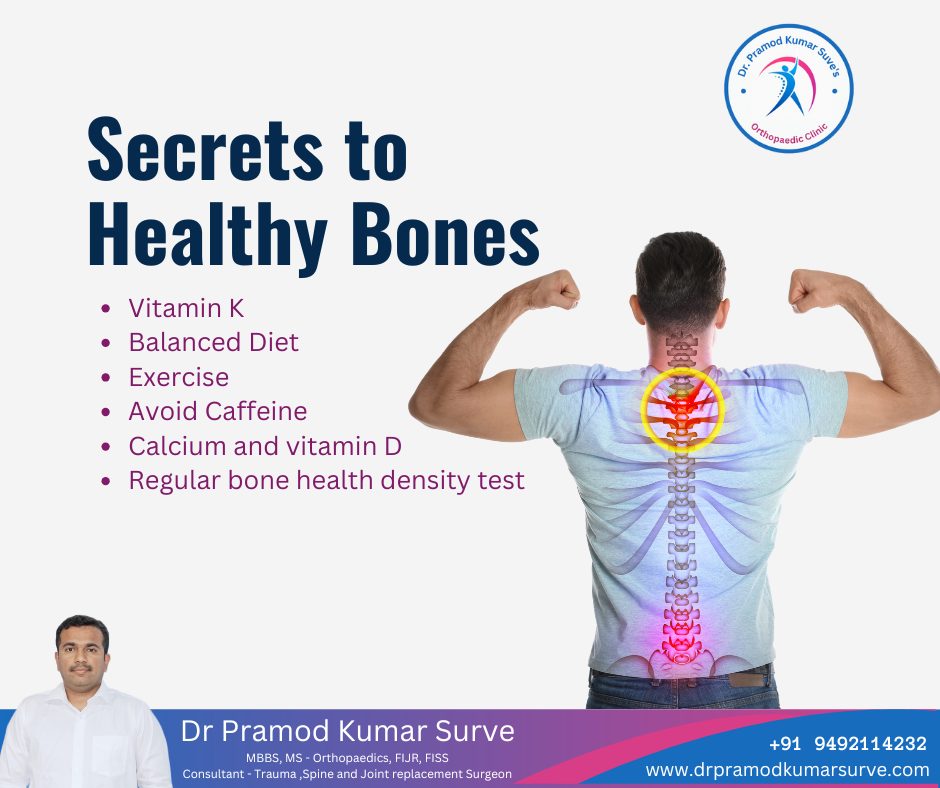Healthy bones form the foundation of a strong and active body. As we age, maintaining bone health becomes increasingly important to prevent fractures, osteoporosis, and other skeletal issues. Dr. Pramod Kumar, a renowned orthopedic specialist, shares practical tips and lifestyle habits to keep your bones healthy and strong for life.
1. Prioritize Calcium Intake
Calcium is the building block of strong bones. Adults require around 1,000 to 1,200 mg of calcium daily. Incorporate calcium-rich foods into your diet, such as:
- Dairy products (milk, yogurt, cheese)
- Leafy greens (kale, spinach, broccoli)
- Fortified foods (orange juice, cereals)
- Almonds and tofu
If you find it challenging to meet your calcium needs through diet alone, consult your doctor about supplements.
2. Get Enough Vitamin D
Vitamin D plays a crucial role in calcium absorption. Sunlight exposure is the natural way to boost vitamin D levels, but dietary sources are also essential. Include fatty fish (salmon, mackerel), egg yolks, and fortified milk in your diet. Supplements may be recommended if you have a deficiency.
3. Stay Physically Active
Weight-bearing and resistance exercises strengthen bones by stimulating bone tissue formation. Dr. Pramod Kumar recommends activities such as:
- Walking, jogging, or hiking
- Strength training and resistance workouts
- Yoga or Pilates for balance and flexibility
Aim for at least 30 minutes of physical activity most days of the week.
4. Avoid Smoking and Limit Alcohol
Smoking and excessive alcohol consumption are harmful to bone health. Smoking reduces blood flow to bones, slowing their healing and weakening them over time. Alcohol interferes with calcium absorption and contributes to bone loss.
5. Maintain a Healthy Diet
In addition to calcium and vitamin D, a balanced diet rich in other nutrients supports bone health. Ensure you consume:
- Protein for bone structure
- Magnesium and potassium to maintain bone density
- Omega-3 fatty acids to reduce inflammation
6. Prevent Falls and Injuries
Strong bones are vital, but preventing injuries is equally important. Simple precautions include:
- Keeping your home clutter-free to reduce tripping hazards
- Using non-slip mats in bathrooms
- Wearing supportive footwear
- Improving balance and strength through exercises like tai chi
7. Monitor Bone Health
Regular check-ups and bone density tests are crucial, especially for individuals at risk of osteoporosis or fractures. Dr. Pramod Kumar emphasizes the importance of early detection and intervention to prevent complications.
8. Hormonal Health Matters
For women, menopause often brings a decline in estrogen levels, which can lead to bone loss. Men should also be aware of hormonal changes that affect bone density. Discuss hormonal health with your doctor to explore options for maintaining strong bones.
9. Stay Hydrated
Dehydration can affect joint health, indirectly impacting bones. Drink plenty of water throughout the day to keep your bones and joints well-lubricated.
10. Consult an Orthopedic Specialist
If you experience persistent joint pain, fractures, or difficulty moving, consult an expert. Dr. Pramod Kumar provides comprehensive care for bone and joint issues, offering personalized advice and advanced treatments to help you stay active and pain-free.
Conclusion Strong bones are the key to an active and healthy life. By following these tips from Dr. Pramod Kumar, you can build and maintain bone strength at any age. Remember, small lifestyle changes today can make a significant difference in preventing bone-related issues tomorrow. If you have concerns about your bone health, don’t hesitate to seek expert guidance and care.
